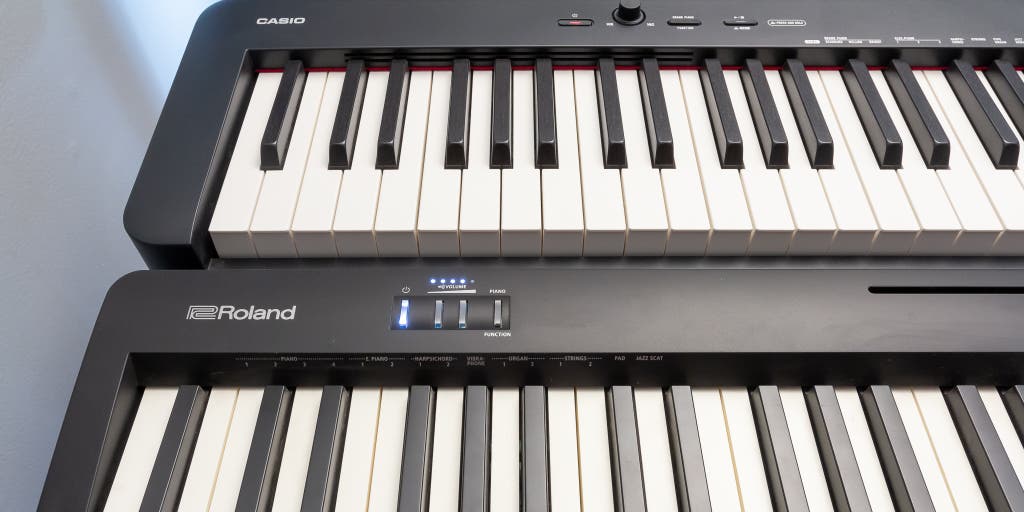1. Introduction to Digital Piano or Keyboard for Beginners
Are you interested in learning how to play the digital piano or keyboard? Whether you’re a beginner looking for your first instrument, or an experienced musician looking to add a new dimension to your repertoire, digital pianos and keyboards are an excellent option. With the right tools, knowledge, and practice, anyone can learn to play this versatile instrument.
2. Benefits of Learning How to Play Digital Piano or Keyboard
Learning how to play the digital piano or keyboard has many benefits. It is a great way to express yourself musically and creatively. It can also help you build important skills such as reading music, understanding rhythm and harmony, and developing coordination between your hands and feet. The digital piano or keyboard can also provide hours of entertainment as you explore different styles of music and create your own compositions.
3. What You Need to Get Started with Digital Piano or Keyboard
To get started playing the digital piano or keyboard, there are some basic supplies that you will need:
• A digital piano or keyboard
• A stand for the keyboard
• A bench (optional)
• An amplifier (optional)
• Headphones (optional)
• Sheet music (optional)
4. Different Types of Digital Pianos and Keyboards
When it comes to choosing a digital piano or keyboard, there are many options available ranging from basic models for beginners to more advanced models for experienced players. The type of instrument that is best for you will depend on your needs and budget. Some popular types of digital pianos include:
• Acoustic-style digital pianos – These are full-size instruments with weighted keys that simulate the feel of an acoustic grand piano. They typically have built-in speakers so they can be used without an amplifier.
• Portable keyboards – These are smaller instruments with unweighted keys that are designed for portability. They often have additional features such as built-in rhythms and accompaniment tracks that make them ideal for playing along with other musicians or creating layered sounds on your own recordings.
5. Setting Up Your Digital Piano or Keyboard
Once you have chosen a digital piano or keyboard, it’s time to set it up! Depending on the type of instrument you have chosen, this process may vary slightly but generally involves connecting the power supply, plugging in any external speakers or amplifiers if necessary, setting up any stands if needed, and making sure all cables are secure before turning on the power switch. Once everything is connected properly, it’s time to start playing!
6. Basic Techniques for Playing the Digital Piano or Keyboard
Playing the digital piano or keyboard requires some basic techniques such as proper hand positioning on the keys; using both hands together; using correct fingering; understanding dynamics (how loud/soft notes should be played); understanding rhythm; understanding harmony; understanding scales; understanding chords; ear training; sight reading music notation; improvisation techniques; and more! All these techniques can be learned through practice and dedication over time – so don’t be discouraged if things don’t come naturally right away!
7. Tips for Improving Your Skills on the Digital Piano or Keyboard
If you want to improve your skills on the digital piano or keyboard quickly, here are some tips:
• Practice regularly – Set aside time each day dedicated solely towards practicing your instrument so that you can stay consistent with learning new techniques and improving upon existing ones.
• Listen closely – Listen carefully when listening back recordings of yourself playing so that you can identify areas where improvement is needed such as dynamics control and phrasing/timing issues etc..
• Learn from others – Watch videos online from experienced players who share their tips & tricks when playing certain songs so that you can learn from their techniques & apply them into your own playing style.
• Take lessons– Taking lessons from an experienced teacher is one of the best ways to quickly improve your skills on any instrument including the digital piano/keyboard.A good teacher will be able help guide & motivate you towards becoming a better player by providing personalized feedback & advice tailored specifically towards helping reach your goals.
8 Conclusion: Why Learning How To Play A Digital Piano Or Keyboard Is Beneficial
Learning how to play a digital piano/keyboard is not only enjoyable but also beneficial in many ways such as improving cognitive abilities,enhancing creativity,providing stress relief,increasing self-confidence,providing hours of entertainment & much more!So whether you’re just starting out as a beginner looking for their first instrument,or an experienced musician looking add another dimension into their repertoire,investing into learning how play this versatile instrument will surely pay off in many ways!
9 Resources For Further Learning About The Digital Piano Or Keyboard Here are some helpful resources which will help further expand upon what was discussed in this article :
• YouTube Tutorials – There are countless tutorial videos available online which cover various topics ranging from basic fundamentals all way up advanced level concepts.Watching these tutorials is great way get familiarized with different aspects related playing this particular type musical instrument.
• Books / Magazines – There plenty books magazines which focus solely teaching readers how play either acoustic grand pianos electric keyboards depending what type prefer.Reading through these materials great way gain deeper insight into subject matter while simultaneously learning practical tips tricks which could apply during practice sessions.
• Online Courses – If prefer more structured approach then taking online courses great option consider since most them come complete with video tutorials quizzes tests ensure students understand material being taught properly.Taking courses like these often times provide students opportunity interact directly instructor ask questions receive feedback real time basis.

